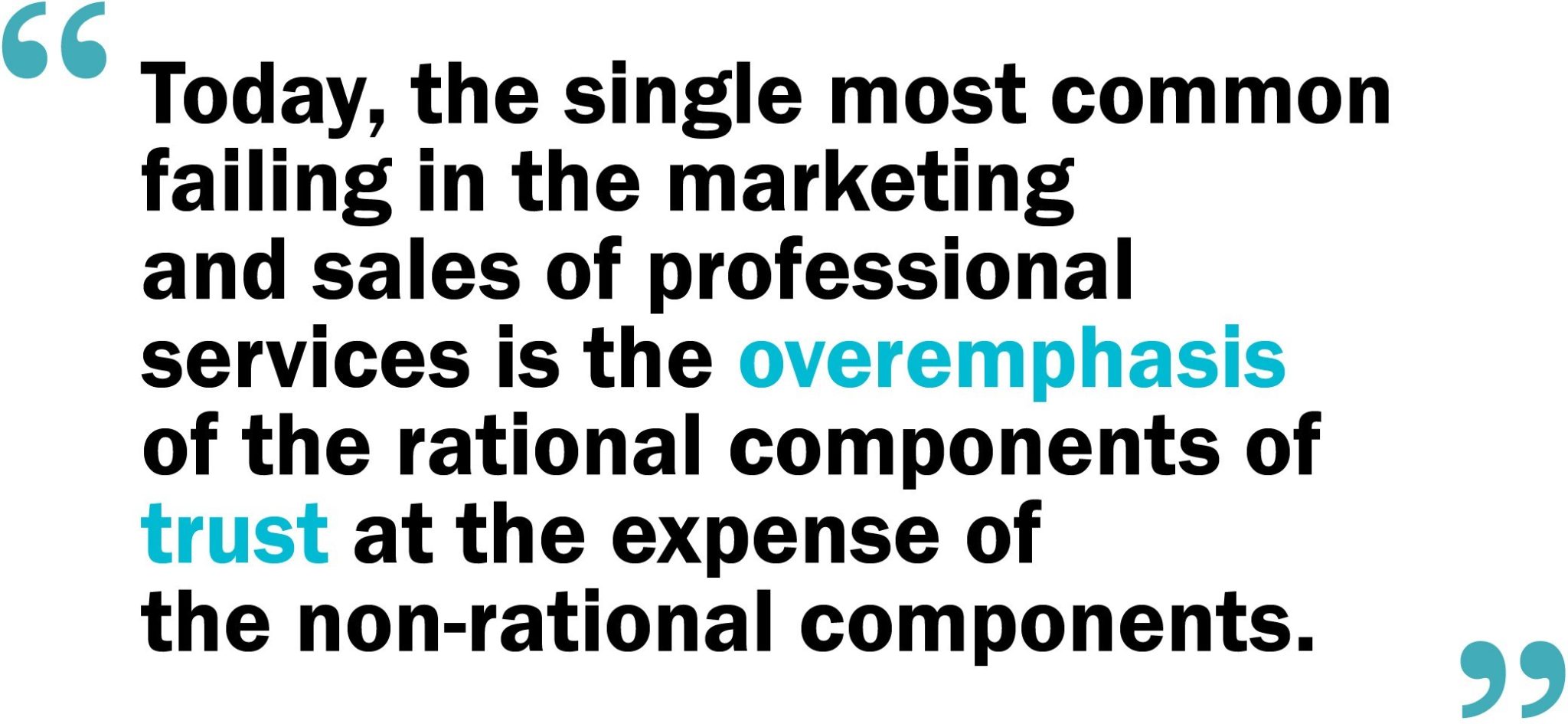Why the Marketing of Professional Services is Different

The marketing of professional services is dramatically different from other products or services. It is psychological and much more personal.
Traditional marketing and sales models characterize the purchase process as a special form of rational decision-making or problem-solving. It follows a sequence like: establish credentials, uncover needs, explore implications, propose solutions, and close the sale.
This model may apply to most product categories and some service-based industries, but it does not help us better understand the best way to market and sell professional services.
First off, it’s important to highlight from the outset that most professional service providers do not consider themselves to be salespeople. Most aspire to technical excellence well ahead of sales expertise. Many are ambivalent about selling; even see it as antithetical to professionalism. What salespeople view as best practices feel, to many service professionals, like manipulation.
This is not a trivial issue.
The biggest challenge facing those marketing and selling professional services is to incorporate ‘selling’ into their view of professionalism. Until consultants embrace, as part of their professional obligation, the importance of promoting their services, they will view many marketing and selling techniques as a necessary evil at best.
Secondly, the traditional sales model is one that depicts the sales effort as unique and distinct from the product or delivery of the service purchased. For professional services, the seller usually is the doer (or supervises the doing). A separate selling function or discipline is relatively rare.
How Things Really Work in the Marketing of Professional Services
Those who sell professional services face several challenges. They are (usually) simultaneously the seller and the deliverer. The buyer buys you, as well as the service. Sales are for very large amounts, with high risk-return ratios, and significant levels of uncertainty about results. Both buyer and seller position the seller as an “expert.” These factors, when combined, make for complex psychodynamics. To begin with, selling and service professionals tend to attract different personalities. Most salespeople are extroverts, are happy to meet new people, tend to focus at the general level, and are impatient with details (gross exaggerations, I know).
The typical service professional is much more cautious and precise. Because the seller and deliverer are usually one and the same in professional services, we cannot avoid the fact that you must sell yourself. This flies in the face of the natural reluctance amongst most professional service providers to “hype” themselves. Professional service providers want to be seen as client-focused, not self-absorbed.
You want to be appreciated for your talents without having to boast or beg. Not only must you sell yourself and your capabilities, but clients also buy your personal characteristics as much as your technical skills. They buy your character, interpersonal skills and judgment – not just degrees and content knowledge. This is something many service professionals really don’t want to believe. Service professionals are the least likely to believe that their selling success rests on personal characteristics. Most want to believe clients buy expertise and content – that’s it.
A New Model for the Marketing of Professional Services
We need a new paradigm for selling professional services. Buying (or choosing not to buy) isn’t just a rational exercise in problem-solving – it’s a response to perceived risk. The risk of buying professional services is very personal. The product is intangible, the stakes are high, the “product” being bought is partly people, the range of outcomes is wide and unclear, and the seller has command of technical expertise that the buyer does not. At Outsource Marketing, we believe the goal of every professional service marketing initiative must speak to one (or more) of the three primary decision drivers of clients – trust, value and like.
Trust
Trust is a factor in all buying, not just of professional services. But what is trust? Trust is not one dimensional; it has four components. And the right mix of components for professional services is not the same as for other businesses.
-
- Credibility has to do with words: “I can trust what he/she says about…”
- Reliability has to do with actions: “I can trust that he/we will do…”
- Transparency has to do with safety: “I can trust talking with him/her about…”
- Self-orientation has to do with focus: “I can trust that he/she is focused on me.”
Two of these factors are largely rational in nature – credibility and reliability. They are assessed through things like accreditation, references, track records and credentials. The other two, transparency and self-orientation, have largely to do with non-rational aspects. They are assessed experientially based on things like ease of communication, a sense of shared understanding, or an ability to see differing perspectives.
The sale of products or services that are largely rational in nature should focus heavily on credibility and reliability. Sales of professional services that have more non-rational issues at stake (think architecture, engineering, accounting, consulting, construction) should put more emphasis on transparency and self- orientation within their sales and marketing strategies and tactics. The following table assesses several characteristics of professional services sales against the four components of trust. It suggests that the non-rational trust components are uniformly critical to many characteristics of the professional services sale.
| COMPONENTS OF TRUST: IMPORTANCE GIVEN… | RATIONAL: CREDIBILITY, RELIABILITY | NON-RATIONAL: TRANSPARENCY, LOW SELF- ORIENTATION |
|---|---|---|
| Highly complex sales process | Low | High |
| Problem definition shifting throughout the sale | Low | High |
| The seller has highly specialized expertise | High | High |
| High level of personal risk to the buyer | Low | High |
| High level of uncertainty of benefit to the buyer | High | High |
Many professional services firms still embrace the traditional sales paradigm, one that emphasizes a very linear and rational approach to decision making. However, this traditional model was designed for products, not services. Today, the single most common failing in the marketing and sales of professional services is the overemphasis of the rational components of trust at the expense of the non-rational components.
An effective strategy for the marketing of professional services must place a greater emphasis on establishing the non-rational components of trust, namely transparency and low self-orientation.
Value
Though we’ve placed value after trust, one could make the argument that a firm must first demonstrate that they can add value to a prospective client before the issue of trust becomes relevant. Demonstrating value often comes down to being able to answer the following three questions in the affirmative:
-
- Are you demonstrating that your firm is uniquely qualified to solve the client’s problem?
- Is your positioning strategy clear, and your value proposition compelling?
- Do your marketing, and brand-building efforts reinforce your position and value proposition at every opportunity?
Like
Often unaddressed, the issue of likability is important to many when selecting a professional services firm. The delivery of professional services often involves close working relationships, which can last several years – especially true for architecture, engineering and construction firms. Demonstrating likability often comes down to being able to answer the following three questions in the affirmative:
-
- Do all client touch-points communicate your brand’s personality and your firm’s culture?
- Do you show clients what it’s like to work with you and your firm?
- Do you demonstrate a clear understanding of their project?
A Few Concluding Thoughts on Worldclass Marketing of Professional Services
Accounting for over three-quarters of Canada’s gross domestic product (GDP), services are the primary driver of our economic activity. Professional services firms are important contributors to the wealth and prosperity of our nation, and they need to understand that the marketing of professional services is different than every other industry.
